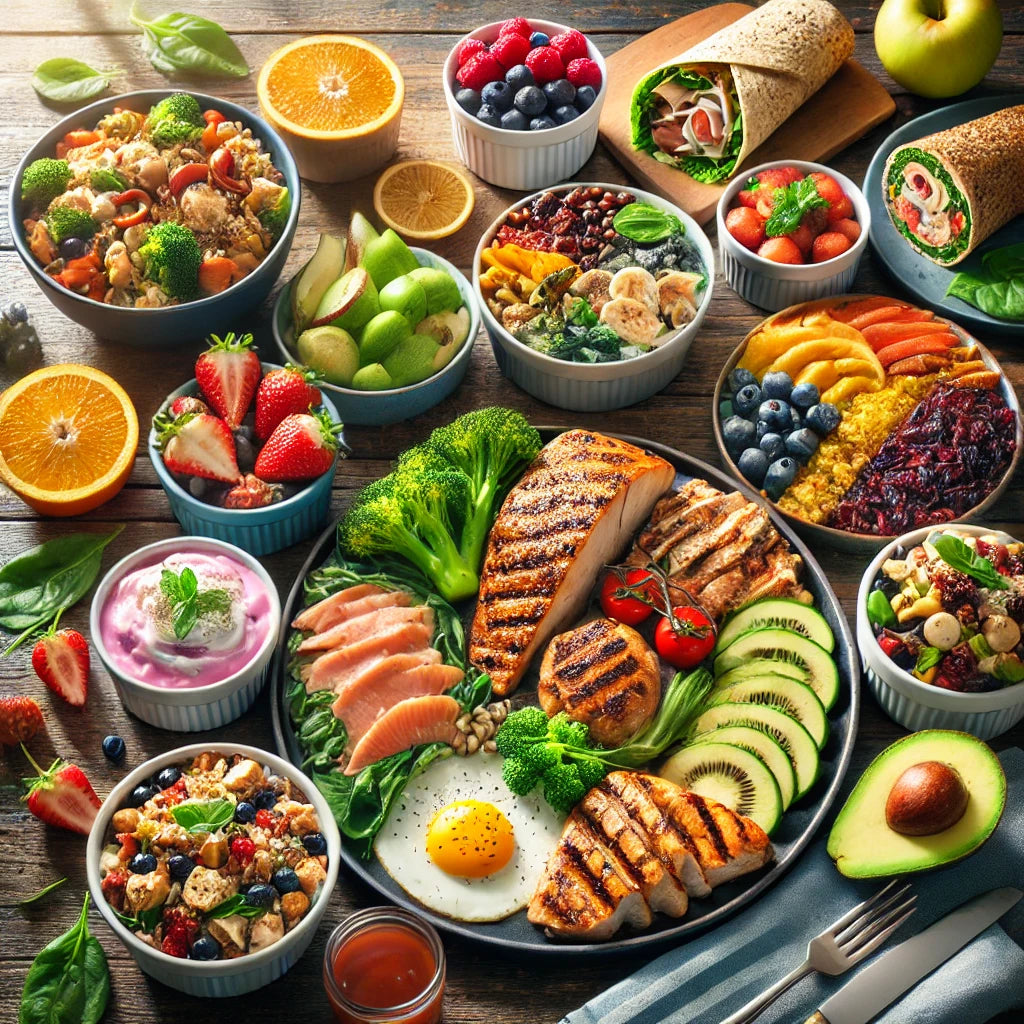
Football Training: 7 Post-Workout Meals for Young Athletes
Share
Post-workout nutrition is one of the fundamental pillars for the recovery and development of young athletes, especially in football. After an intense workout, the body needs specific nutrients to repair muscles, replenish energy reserves and prepare for future training sessions. In this article, we present seven post-workout meal options, one for each day of the week, explaining their importance and the ideal time to eat them.
The Importance of Post-Workout Meals
After training, the body is in a catabolic state, that is, the process of breaking down tissues, especially muscle tissue, is accelerated. Eating a proper meal helps to:
- Repair and build muscle : Protein provides the amino acids needed to repair micro-tears in muscles and promote muscle growth.
- Replenish glycogen stores : Carbohydrates are essential for replenishing muscle glycogen stores, which are depleted during exercise.
- Rehydrating the body : Replacing fluids lost through sweat is crucial to avoid dehydration and maintain electrolyte balance.
When to Eat a Post-Workout Meal?
The post-workout meal should be consumed between 30 minutes and 2 hours after the end of the workout. This interval is known as the "anabolic window", during which the body is most efficient at using nutrients for muscle recovery and growth.
Post-Workout Meals for Every Day of the Week
Monday: Grilled Chicken Breast with Brown Rice and Broccoli

Ingredients:
- 150 g grilled chicken breast
- 1 cup cooked brown rice
- 1 cup steamed broccoli
- 1 drizzle of olive oil
Benefits: This meal is rich in lean proteins and complex carbohydrates, providing the nutrients needed for muscle repair and energy replenishment.
Tuesday: Spinach and Cheese Omelet with Roasted Sweet Potatoes

Ingredients:
- 2 eggs
- 1 handful of fresh spinach
- 30 g low-fat cheese
- 1 medium sweet potato, baked
Benefits: The omelet provides protein and vitamins, while the sweet potato offers complex carbohydrates and fiber, essential for muscle and digestive recovery.
Wednesday: Grilled Salmon with Quinoa and Sautéed Vegetables

Ingredients:
- 150 g grilled salmon
- 1 cup cooked quinoa
- 1 cup of sautéed vegetables (peppers, zucchini, carrots)
- 1 tablespoon olive oil
Benefits: Salmon is an excellent source of protein and omega-3, which help with muscle recovery and reduce inflammation. Quinoa offers a combination of protein and carbohydrates.
Thursday: Chicken Wrap with Avocado and Lettuce

Ingredients:
- 1 whole wheat wrap
- 100 g shredded chicken
- ½ sliced avocado
- Lettuce leaves
- 1 tablespoon of natural yogurt
Benefits: This wrap is a practical option rich in protein, healthy fats and carbohydrates, providing a complete and balanced meal.
Friday: Whole Wheat Pasta with Turkey Meatballs and Tomato Sauce

Ingredients:
- 100 g wholemeal pasta
- 4 turkey meatballs
- ½ cup homemade tomato sauce
Benefits: This meal is ideal for replenishing glycogen stores, thanks to the carbohydrates in the pasta. The turkey meatballs provide lean protein, which is essential for muscle recovery.
Saturday: Chicken Salad with Quinoa

Ingredients:
- 100 g grilled and shredded chicken breast
- 1/2 cup cooked quinoa
- 1/2 cup sliced cucumber
- 1/2 cup cherry tomatoes, cut in half
- 1/4 cup grated carrot
- Lettuce and arugula leaves to taste
- 1 tablespoon olive oil
- Lemon juice, salt and pepper to taste
Preparation: Mix all ingredients in a large bowl and season with olive oil, lemon juice, salt and pepper. Serve immediately.
Benefits: This salad is light but rich in protein and carbohydrates, essential for muscle recovery after training. Quinoa provides an extra dose of protein and fiber, while vegetables provide vitamins and minerals that help with tissue regeneration and nutrient replenishment.
Sunday: Tuna Steak with Sautéed Sweet Potato and Spinach

Ingredients:
- 150 g grilled tuna steak
- 1 medium sweet potato, boiled or baked
- 1 cup sautéed spinach
Benefits: Tuna steak is rich in protein and omega-3, which promote recovery and reduce inflammation. Sweet potato provides long-lasting energy, essential for glycogen replenishment.
Conclusion
Post-workout meals are essential for the recovery and growth of young athletes. By providing the necessary protein, carbohydrates and healthy fats, these meals help to repair muscles, replenish energy and prepare the body for the challenges ahead. Ensuring these meals are eaten at the right time optimises results, allowing young footballers to reach their full potential.
Suggested related articles
Football Training: 7 Breakfasts for Young Athletes
Football Training: 7 Pre-Workout Snacks for Young Athletes
Football Training: 7 Post-Workout Meals for Young Athletes
What is the right training program for me?
We recommend that you check which training program is best suited for you. Find out which training program is right for you where after completing the questionnaire we will help you identify the ideal training plan based on your goals and fitness level, ensuring more efficient and targeted development.
Revenues:
- Chicken Salad with Quinoa and Avocado
- Recipe: Protein Pancakes
- Chicken Salad with Quinoa and Avocado
- Recipe: Banana Smoothie with Rice and Oat Milk
- Green Detox Smoothie Recipe
Other topics:
Challenge of the day | Tips | Training
Suggested services:
Diagnosis, assessment/reassessment | Planning | Accompanied training
Suggested ebooks:
100 No Excuses Workouts | Amateur race | Fitness Detox
Suggested training programs:
Military training | Metabolic training
Where to buy Food Supplements
Whey protein 900g chocolate flavor
Creatine monohydrate with Creapure® seal 240 capsules
Omega-3 Supplement
For more tips on training and health care, continue to follow our articles at www.treinoemcasa.com



